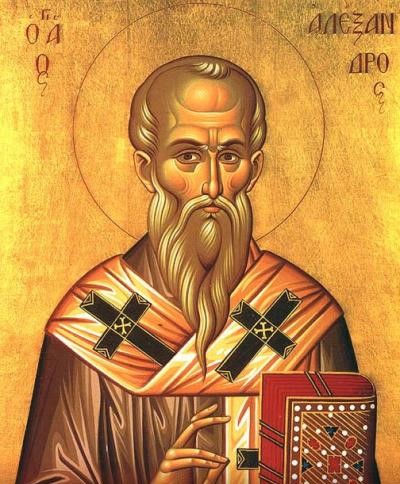
Saint of the Day for 26 February: St. Alexander of Alexandria
St. Alexander of Alexandria: Life, Legacy and Role in the Council of Nicaea
Name
St. Alexander of Alexandria
Title
Patriarch
Birth
250, Alexandria, Egypt
Death
326, Alexandria, Egypt
Recurrence
26 February
Martyrology
2004 edition
Prayer
Saint Alexander today I elect you
as my special patron:
sustain in me Hope,
confirm me in Faith,
make me strong in Virtue.
Help me in the spiritual struggle,
obtain for me from God all the Graces
that are most needed by me
and the merits to attain with you
Eternal Glory. Amen.
Roman Martyrology
Commemoration of St. Alexander, bishop: a glorious elder with a fervent zeal for the faith, who became after St. Peter head of the Church of Alexandria, separated from ecclesial communion his priest Arius, perverted by his insane heresy and refuted by divine truth, which he later condemned when he joined the three hundred and eighteen Fathers of the Council of Nicaea I.
The Saint and Mission
Saint Alexander of Alexandria, bishop and theologian of the 4th century, emerges as a central figure in the panorama of the ancient Church, especially for his decisive role in the defense of the Orthodox faith against the Arian heresy. His mission, intrinsically linked to the fight for the integrity of Christian doctrine, reflects a profound commitment to the truth of the Gospel and to the cohesion of the community of believers. The life of Saint Alexander took place in a period of theological turbulence and ecclesiastical challenges, where the question of the divinity of Christ threatened to divide the Church. His mission, therefore, was not only of a pastoral nature, but also deeply dogmatic, committed to the defense of the Nicene faith against the claims of Arius and his followers, who denied the consubstantiality of the Son with the Father. Saint Alexander’s determination to counter these heretical ideas, culminating in his participation in the Council of Nicaea, demonstrates his dedication to safeguarding revealed truth and promoting Christian unity. In addition to his battle against Arianism, St. Alexander’s mission was deeply rooted in the pastoral care of his diocese. He led his community with wisdom and love, exemplifying the bishop’s role as shepherd of souls and defender of the faith. His spiritual leadership was not only a matter of authority, but also of service, reflecting Christ’s teaching on the primacy of humble service in the community of believers. The figure of Saint Alexander of Alexandria also reminds us of the importance of theological training and spiritual preparation in the life of the Church. His commitment to the education of the faithful and the training of future ecclesiastical leaders, including his illustrious successor, Athanasius, underlines the crucial role of teaching and personal example in the transmission of the faith. The mission of Saint Alexander of Alexandria teaches us that the defense of the truth of the Gospel and the care of the community of believers are intrinsically connected tasks in the life of the Church. His spiritual legacy, which endures through the centuries, invites us to remain steadfast in faith, united in love and diligent in the search for truth, following the example of this great defender of Christian orthodoxy and pastor of his people.
The Saint and Mercy
Saint Alexander of Alexandria, in his life and episcopal ministry, embodies mercy in ways that resonate deeply with the essence of Christianity. His era, marked by theological divisions and doctrinal disputes, required a leader who was not only firm in faith, but also deeply immersed in the practice of Christian mercy. His mission, full of challenges, was illuminated by this key principle of the Gospel. The mercy of Saint Alexander emerges clearly in his fight against the Arian heresy. Although he was firmly committed to the defense of the Church’s orthodox doctrine, his response to controversy was never without compassion. He confronted heresy with the truth, but always sought to lead the misguided back to full communion with the Church through dialogue, teaching and patience. His ability to maintain doctrinal firmness and merciful openness reflects a profound balance between justice and mercy. Furthermore, St. Alexander’s pastoral care for his diocese reveals his commitment to mercy as a daily act of love and service. He guided his community through examples of life lived in the Gospel, showing particular attention to the needy, the marginalized and sinners, to whom he offered hope and the possibility of spiritual renewal. His ministry was a continuous invitation to conversion, rooted in the belief that God’s mercy is always greater than our failures. St. Alexander’s leadership during the Council of Nicaea also demonstrates how mercy can influence decisions that impact the entire Church. His defense of the Nicene faith was driven by a desire to preserve the unity of the Church in the love of Christ, recognizing that at the center of the theological debate was the revelation of divine love and mercy embodied in Jesus Christ. The life of Saint Alexander of Alexandria reminds us that mercy is fundamental in the life of the Church and in the testimony of the Christian. His example inspires us to live our faith with a heart open to mercy, ready to defend the truth with love and to serve others with compassion. His spiritual legacy invites us to recognize that, even in moments of greatest division or difficulty, the call to mercy remains a luminous guide towards unity and peace in the Body of Christ.
Hagiography
St. Alexander, Bishop of Alexandria in Egypt from 312 to 326, was one of the protagonists of that painful struggle that opened the long and insidious affair of the heresy known in Church history as Arianism. It seems that it was out of envy of Alexander, who had been elected Bishop of Alexandria, that the ambitious priest Ario, an aspirant for that appointment, began his insidious sobillation. Cultured, eloquent and…
